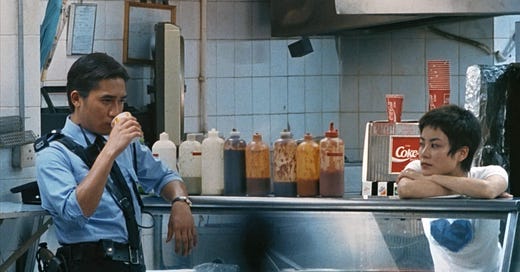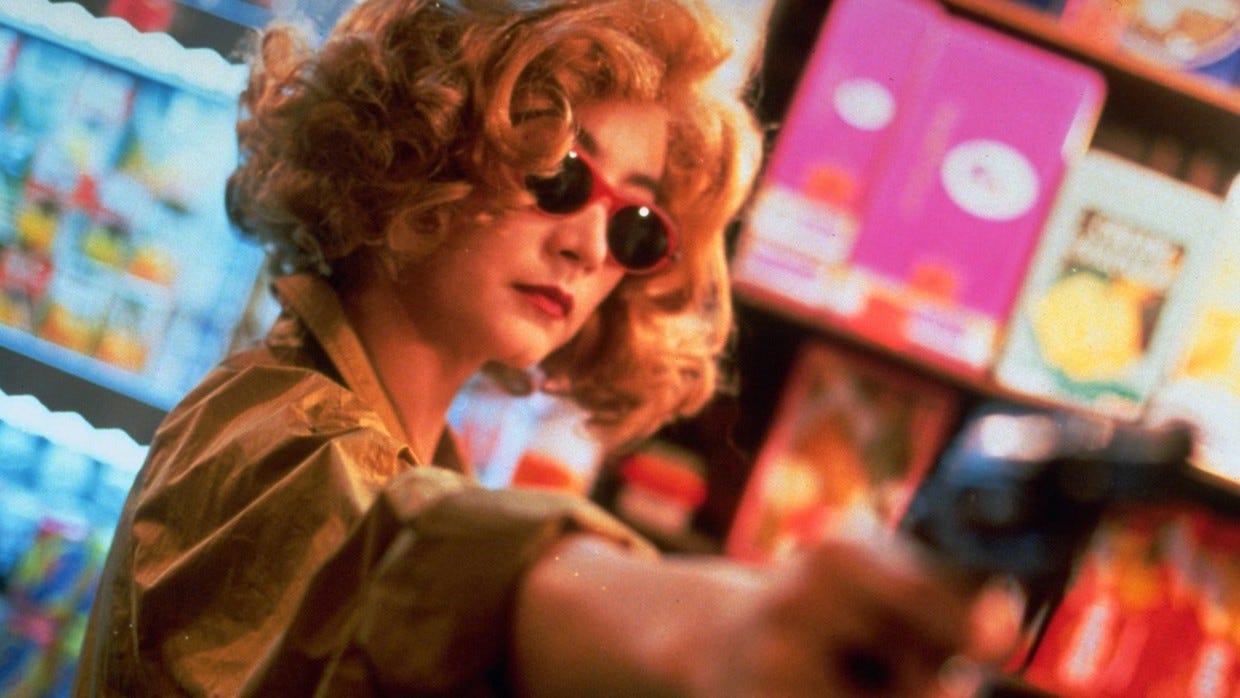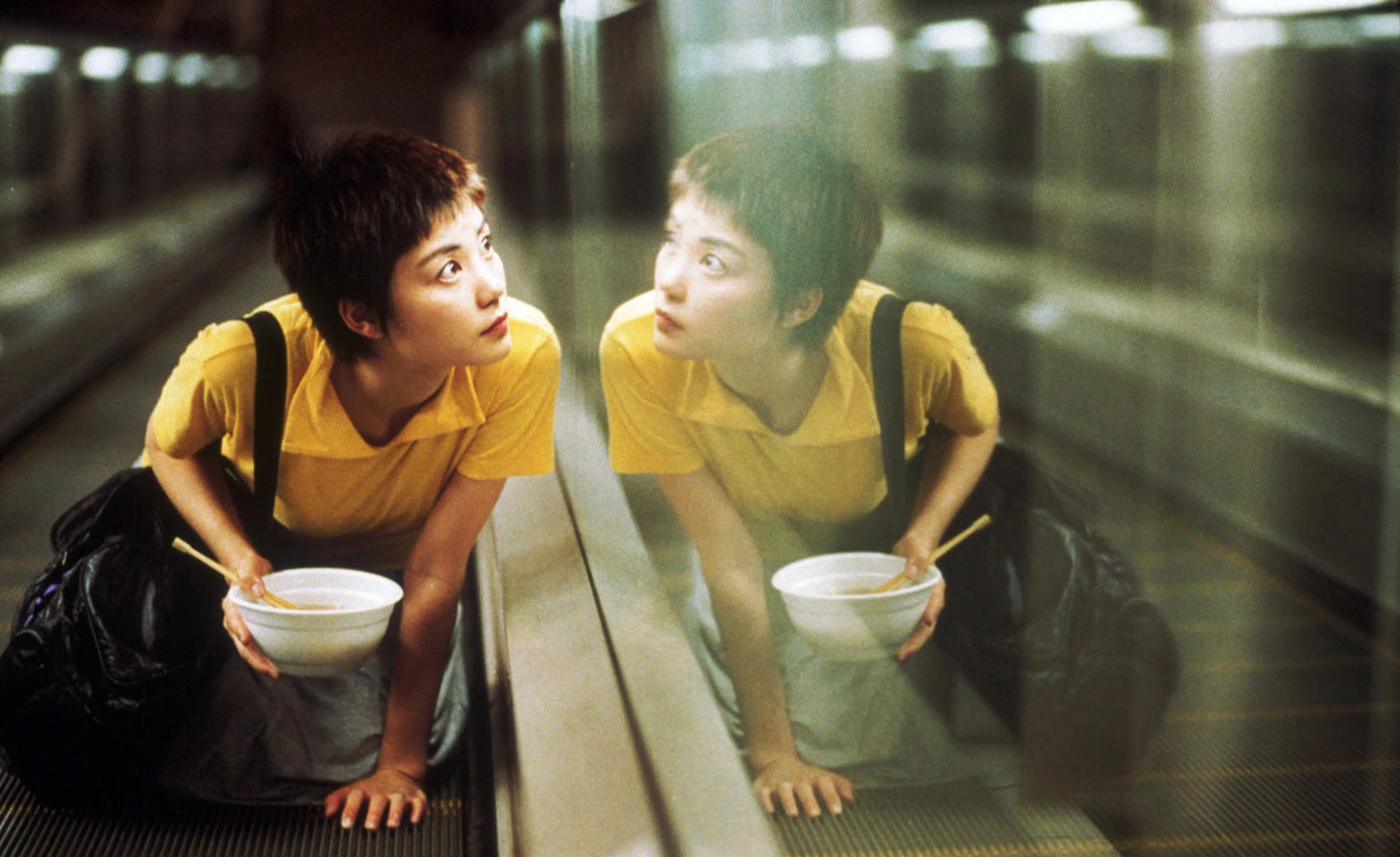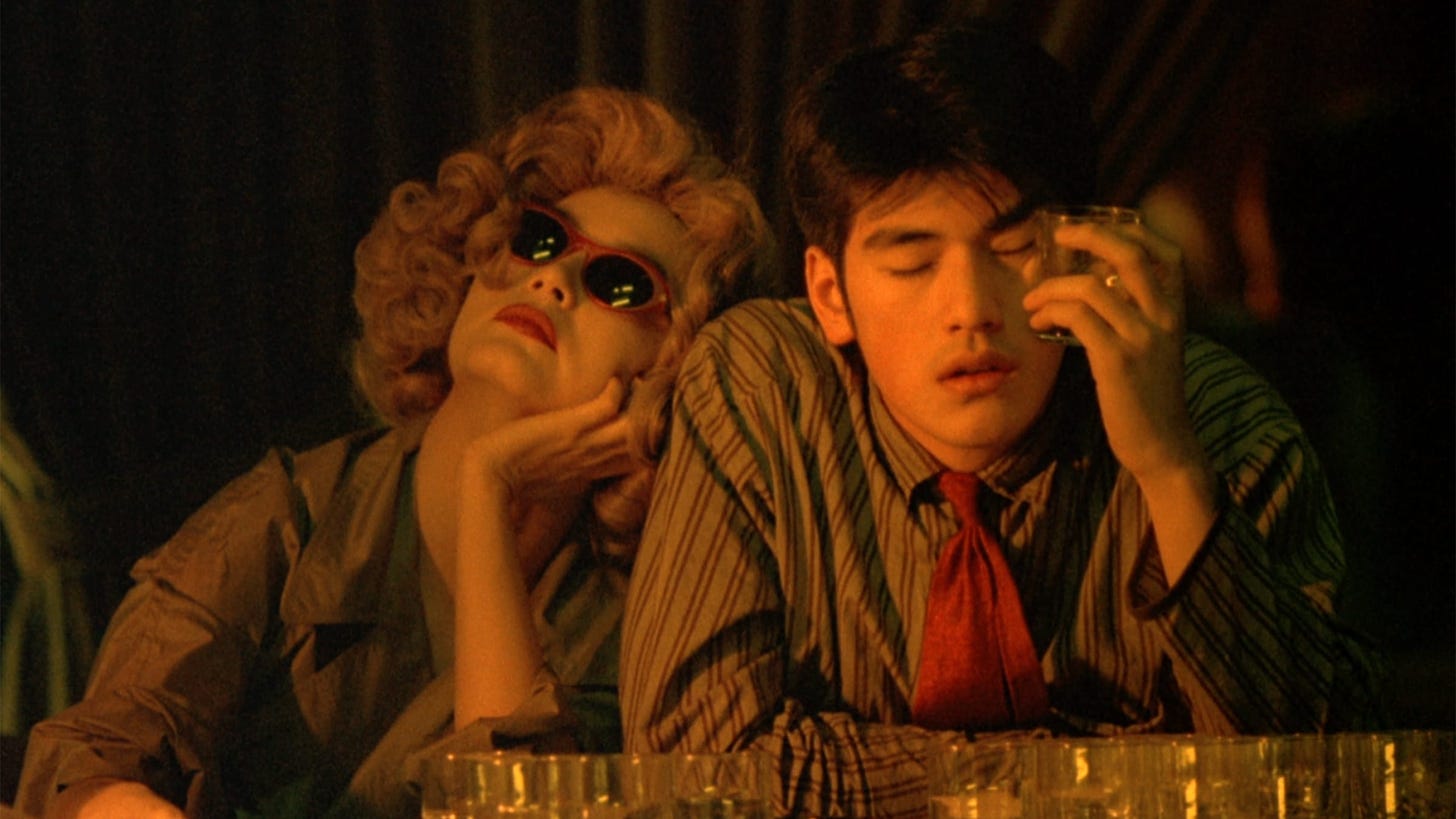#88 (tie): 'Chungking Express': The Reveal discusses all 100 of Sight & Sound’s Greatest Films of All Time
Made during the director's downtime on another movie, Wong Kar-wai's 1994 breakthrough captures a Hong Kong filled with characters driven half-mad by love.
On December 1st, 2022, Sight & Sound magazine published “The Greatest Films of All Time,” a poll that’s been updated every 10 years since Bicycle Thieves topped the list in 1952. It is the closest thing movies have to a canon, with each edition reflecting the evolving taste of critics and changes in the culture at large. It’s also a nice checklist of essential cinema. Over the course of many weeks, months, and (likely) years, we’re running through the ranked list in reverse order and digging into the films as deep as we can. We hope you will take this journey with us.
Chungking Express
Dir. Wong Kar-Wai
Ranking: #88 (tie)
Previous rankings: #144 (2012)
Premise: Hong Kong, 1994: It’s three years before the handover of Hong Kong to the People’s Republic of China in 1997, and while that goes unmentioned, the sense of time running out hangs over both stories in this film about characters standing on the edge of tremendous changes. In the first, Takeshi Kaneshiro plays He Qiwu, a.k.a. Cop 223. His beat includes Chungking Mansions, a shady apartment complex/black market (and childhood home of the film’s director) but he’s more focused on his own heartbreak, which has led to a month-long ritual of eating a tin of pineapples set to expire on May 1st, his birthday, as he holds out hope for reconciliation. Meanwhile, a woman wearing sunglasses and a blonde wig (Brigitte Lin) realizes she’s been double-crossed in a drug deal by her partner. In the second story, set elsewhere in the city and largely centered around the Midnight Express snack bar, Cop 663 (Tony Leung) is also reeling from a break-up following the unceremonious departure of his stewardess girlfriend (Valerie Chow). After capturing the attention of Midnight Express worker Faye (Faye Wong), he unwittingly becomes the object of her attempts to improve his life.
Keith: Swoon. I have so much love for this movie, which arrived seemingly out of nowhere and instantly became a favorite when I pulled it off the video store shelf after it arrived in the U.S. in 1996. (You might recall that its release was part of Quentin Tarantino’s short-lived Rolling Thunder Pictures imprint. The VHS box even had Tarantino’s face on it.) I’d already developed an interest in the explosion of Hong Kong filmmaking of the ’80s and early ’90s, but this was another sort of film entirely—hard to define and shockingly new in style and boldness, and emotionally immediate—even if Wong Kar-Wai’s career is rooted in the same industry that produced, say, Ringo Lam. In fact, Chungking Express might not exist were it not for Wong’s only attempt (to date) to make a wuxia film filled with big-name stars, Ashes of Time.
Though the resulting film is anything but conventional, it was at least conceived as a film with broad appeal. During a break in editing Ashes, Wong decided to make something he could write and film quickly. Where Ashes required elaborate costumes and period trappings, Chungking Express could be shot on the streets of contemporary Hong Kong (often without securing permits). The result is a snapshot of Hong Kong at a particular moment in its history. (In fact, parts of Kowloon, the setting for the first story, were most likely being demolished while the film was being made, though Chungking Mansions still stands.) Or, as Amy Taubin, comparing the film to Godard’s Masculin Feminin puts it, “What Jean-Luc Godard did for ‘the generation of Marx and Coca-Cola’ in the mid-1960s, Wong Kar-wai did for restless Hong Kong youth during the anxious decade that preceded the handoff to China.”
Taubin’s not the only critic to compare Wong to Godard in this phase of his career, which makes sense. Chungking has the kinetic energy and let’s-go-for-it visual experimentation (with the assistance of cinematographers Christopher Doyle and Andrew Lau) of one of Godard’s early films and the film’s first story exists on the far fringes of the crime drama. There’s shootouts and intrigue, but Wong’s more interested in what happens between those moments. Cop 223 is apparently good at his job, though it’s hardly his primary interest. But I think the comparison only goes so far. There’s a warmth and romanticism to Chungking that I’ve never felt in a Godard film.
Scott, did this film win your heart like it did mine? And let me throw in another Taubin observation to contemplate, which rang true to me. She noted that, also like Godard and Masculin Feminin, Wong was a decade older than Chungking’s central characters and that the “generation gap imparts a sense of distance mixed with tenderness.” That description feels apt for other Wong films, too (one of which lies ahead on this list).
Scott: Swoon is definitely the word for it. Chungking Express was my first encounter with Wong, as I imagine it was for a lot of people, and indeed it was Tarantino’s Rolling Thunder label that made it happen. At the time, I was working for Video Library in Athens, and we were so crazy for Hong Kong cinema that we ordered enough VHS tapes to create a new section: The John Woo/Chow Yun-Fat collaborations, the Once Upon a Time in China movies, Jackie Chan, The Heroic Trio, God of Gamblers, etc. The Tarantino endorsement was a big draw, of course—he was hot off Pulp Fiction at the time—and you can watch his charming video introduction/discussion of it here. You can see how Tarantino and Wong’s sensibilities overlap in how they tackle Godard, particularly the Godard of films like Masculin Feminin and Band of Outsiders, which have a certain youthful energy and cool, and connection to popular culture.
But the revelation of Chungking Express for me, having immersed myself so much in Hong Kong cinema, is the space it carved out for itself as a quirky, romantic piece of pop art with an evocative and personalized sense of the city. It feels both part of and apart from the whole movement, and it also seems to suggest that Wong was more comfortable making it than trying to work his sensibility around a more traditional wuxia in Ashes of Time. (Though about two decades later, he’d figure out how to do his version of a martial arts movie with The Grandmaster and absolutely crush it.) It’s funny how the Godard influence had a way of lighting a spark in emerging national cinema, as we’ll see again when we get to the #66 on the Sight & Sound list, the Senegalese film Touki Bouki.
Truth be told, Chungking Express is the sort of whimsical, serendipitous romantic comedy that I’m temperamentally inclined to resist, given all the cute behavioral quirks of its characters—Qiwu with his quest to find (and later consume all at once) cans of pineapple that expire on the same date; Cop 663 with his habit of talking to bars of soap, dishrags, and various stuffed animals around his apartment; and Faye with her odd impulse to sneak into Cop 663’s place, do a little light cleaning, and stock up his fish tank. (I’m reminded of the classic Onion story, “Romantic-Comedy Behavior Gets Real-Life Man Arrested.”) And yet, the film works like gangbusters, because it’s so alive with romantic spirit and connected to the milieu in such a visceral way.
Wong was able to make the film during a pause from the grinding process of whipping Ashes of Time into shape in the editing room, and the spontaneity and lightness of Chungking Express are so crucial to what makes it so transporting. His filmmaking process has been likened to jazz and the one aspect where that really bears out is his relentless search for moments out of time, when the frenetic world slows down and two people make a connection. He highlights it a couple of times when two characters pass “.01 cm apart from each other,” but then you get a moment like one of the most famous shots in the film, when Faye is staring at Cop 663 from across the takeaway counter where she works. In the foreground, the blurred figures of a typically bustling Hong Kong evening are flitting by while in the background, time has almost stopped completely to capture Faye’s longing as she gazes at Cop 663 nursing his coffee. (And who can blame her? It’s Tony Leung!)
There’s a lot more about the style that I want to talk about, but my question to you, Keith, is why do we end up caring so much about the four primary characters here: One cop who eats expired pineapples and jogs to sweat out water so he won’t have any left for tears? Another cop who orders chef’s salads and pines for the stewardess girlfriend who left him? The strange woman in the blond wig whose drug-smuggling scheme goes awry? The California dreamer who breaks into her love interest’s apartment? I’m still amazed by how little resistance I put up to a movie that, by description, might make me roll my eyes.
Keith: I think, as you suggest, it’s a case of Wong’s style barreling over any objections. Which isn’t to say it’s style triumphing over substance. The bare description of the plot you lay out does sound way too precious, but it doesn’t take into account how moving the execution is, or the performances.
To choose the most mysterious character, Blonde Wig (I’ll just use that as a character name for convenience) appears imperturbably cool even as she realizes she’s been betrayed by her partner in crime. (I think it’s safe to say he’s her lover based on the way he gives her replacement a blonde wig). But with each repetition of Dennis Brown’s “Things in Life” she seems a little more vulnerable and she even leaves Cop 223 a nice little thank you message. Leung conveys sensitivity without any effort. Faye’s bizarre behavior feels like an accurate depiction of how love and madness can sometimes be hard to tell apart. (For a strand of cinephiles of a certain age, Faye Wong became the cinematic equivalent of another classic Onion story.) Blonde Wig is also the oldest of the characters by several years. Lin would essentially retire from acting in 1994 at the age of 40. The rest are barbies still figuring out how the world works. How can you not feel for them? The short answer to your question is, yes, I do care about these characters, whose humanity never gets lost in their story’s peculiar twists or the stylistic rush surrounding them.
That style though, right? Ashes of Time and Days of Being Wild, the films Wong shot before this (even if Chungking preceded Ashes’ release), are both enveloping and beautiful, but they move at a far statelier pace and in a more controlled style. Chungking vibrates with the energy of a filmmaker with little to lose, trying on a new way of making films dictated by the city around him. And while W0ng’s become famous for improvising and shooting more than he needs to shoot, then carving the film he wants out of the material, Chungking, like Wong’s best subsequent films, plays like it was always meant to have the shape it takes, with its meaningful repetitions and mirror images. Its two stories don’t so much overlap as bounce off one another. When Cop 223 essentially hands the film off to Faye and 663, the moment’s audaciousness is thrilling in a way I don’t know that I’ve ever seen in any other movie. His story is out of gas. Cue “California Dreamin’” and now we’re doing something else entirely.
Or almost entirely: both stories. I don’t think the two parts of Chungking Express would work nearly as well on their own, and not just because neither has enough story to sustain an entire feature. It’s not even the contrast between its two parts, which essentially belong to different movie genres, that makes the film work (though that’s significant, too). It’s that together they convey the sense of a whole city filled with heartbroken twentysomethings whose feelings make them act out in bizarre ways, even distorting their perceptions of reality. Cop 223 sounds so reasonable explaining his compulsive pineapple consumption that it’s almost persuasive. Maybe Cop 663 can forget he replaced a skinny bar of soap with a fresh one, but could he really mistake his big, fuzzy stuffed bear for Garfield? We see the stories of these four people, but the sense is that similar stories are playing out all over Hong Kong.
In fact, Wong’s follow-up, Fallen Angels, was originally conceived as part of this film. It plays like a dark B-side to Chungking’s sunny pop hit A-side. Even so, do these stories have happy endings? Cop 223 seems ready to move on, but who knows? Blonde Wig walks away to an uncertain fate. And with Faye and Cop 663, Wong sets up a movie-perfect happy ending then pulls the rug out from under it by having Faye fail to show up for their date, then concludes with an uncertain but hopeful coda. Also, I’ve touched on the performances, but I’d love to hear your thoughts. It’s probably worth noting something that might not be apparent to everyone reading: this is a film filled with some of the biggest Asian stars of its era, many of whom were also all-around entertainers with, among other pursuits, music careers. Faye Wong only made a handful of films, including Wong’s 2046 but she remains a huge pop star in Asia. Even if you don’t know that, Wong these are glamorous screen presences, a continuation of Wong’s preference for big stars which he’s had since the beginning of his career. Does that make a difference even in the midst of the loose, seemingly on-the-fly filmmaking?
Scott: I have some thoughts on the performances, but I want to start by noting an important part of Wong’s movies, which is in evidence in Chungking Express, too: Routine. It’s funny to think about the contradictory nature of films that seem so liberated and spontaneous being built on repetition, but that’s a central tension in a lot of Wong’s work. On their own, each of these characters either revert to patterns of behavior or create them: Both of our cops keep coming back to the same takeaway joint, Midnight Express, ordering their chef’s salad or their black coffee and chopping it up with the manager (a delightful Chan Kam-chuen). Blonde Wig unwinds (and does business) at the Bottoms Up Club, to the tune of that same Dennis Brown song. Faye works her shift at Midnight Express with “California Dreamin’” blaring at such a high volume that she can’t hear orders. Even as their lives change, they fall into new routines: Qiwu with his nightly hunt for expired cans of pineapple, Cop 663 with the same lunch on his new beat, and Faye with her visits Cop 663’s apartment, which leaves Midnight Express with an unpaid electricity bill.
It seems to be Wong’s belief that humans are creatures of habit, but the effect of all this repetition is that we notice when the characters are shaken out of those routines and the world changes for them. This will be a major theme when we get to In the Mood for Love later in the list, but I think there’s something remarkable about how Wong’s obsession with behavior never feels mundane or closed off from the possibility of a chance encounter or a love connection. That .01 cm gap between two people passing each other in the night can be closed when their routines overlap or their paths collide serendipitously. All of these characters are single and unattached, and so their invisible fence that they’ve constructed around themselves winds up reinforcing their loneliness. It’s a mercy for Wong to contrive moments when their lives can intersect.
As to the performances, I think Wong likes casting stars because they have a charisma that’s off the charts. Movie stars are aliens. That’s always been my experience when I’ve interviewed them in person, that they’re somehow more exotic in the flesh than they are on the big screen. And this includes Tony Leung, who I interviewed briefly back in the early 2000s, perhaps for In the Mood For Love. (Not sure what happened with that interview, but my chat with Wong survived and holds up quite well, I think.) In Chungking Express, feelings are better expressed than said, so when you have a star like Leung, whose screen persona is defined by a soft-spoken elegance, there’s no need for dialogue for the audience to pick up on who he is.
The casting of Faye Wong is perhaps key to unlocking Wong’s intent with Chungking Express. She had established herself as a significant pop star in East Asia before the film and that’s her Cantonese cover of The Cranberries’ “Dreams” toward the end. (I was a stalwart Cranberries hater at the time, but of course loved her version in the context of a film by the coolest director alive.) In my interview with him—I absolutely love that I can use that phrase—Wong likened Chungking Express to a pop song and In the Mood For Love to chamber music, and of course the soundtracks themselves bear that thought out. But there’s a lightness to the way Faye Wong carries herself that sets the tone for the second story. She can be forgiven for breaking and entering.
I’d written before about Wong’s films being about capturing moments out of time. Do you have any moments out of time that you find particularly enchanting in Chungking Express? I know I have a few I can share.
Keith: Some of my favorite moments are tied to the film’s voiceover. We’ve talked so much about the style of Chungking Express, I don’t want to breeze past its qualities as a piece of writing. Our four lead characters aren’t very good at talking to one another, so there’s not much in the way of memorable dialogue. But narration turns them into poets and philosophers. The first instance of the “.01 cm” phrase you mention is followed by 223 saying “57 hours later I fell in love with this woman,” the sort of line that demands viewers pay stick around to find out what happens next. When Faye finally gets a voiceover toward the end of the film she offers a line to explain her disappearance—“I needed to know if the other California was warm and sunny”—that gives her character a new dimension, even if it doesn’t make much literal sense.
As for moments, I’ve already mentioned my favorite moment, when the baton gets passed from one set of characters to another. To that I’ll add 223 and Blonde Wig getting drunk in the bar—a bit of trivia: the Bottoms Up Club is also featured in The Man with the Golden Gun—which provides two characters who should be enemies with a moment of connection. And, of course Faye dancing to “California Dreamin’.” The latter is the scene where Wong’s decision to repeat the same song over and over really pays off. As the soundtrack jump cuts from one part of the track to another it becomes comical but also more meaningful. What is it about this song for Faye? What does she hear that others don’t? Maybe she doesn’t even know.
How about yours?
Scott: The film had me at hello. I love the establishing shots of Blonde Wig working her way through a blurry night scene in Hong Kong, set to the instrumental piece “Baroque” by Michael Galasso. We meet her and Qiwu during this sequence, which includes that “.01 cm” narration you describe above, and we also get a feel for the underground, immigrant scene in which Blonde Wig tries to operate. But most importantly, Wong is setting up a sense of place with this frantic, bustling Hong Kong, and the music is both chaotic and a little mysterious.
More moments: Brigitte Lin doesn’t alter her stone-faced expression much throughout the film, which makes it particularly funny when she nonchalantly kidnaps a little girl in a bid to get information from the kid’s father. (She feeds the girl sundaes while waiting for her dad, which is wholesome in its way.) On the comedy front, I also enjoyed poor, pitiful Qiwu working the pay phone to find a rebound date. (“We went to fourth grade together, remember?”) The second story has most of the film’s most indelible scenes. The flashback with Cop 663 and his stewardess ex-girlfriend is so casually sexy, with “What a Diff’rence a Day Makes” on the soundtrack and a post-coital scene of Tony Leung landing a model airplane on the sweat-glistened small of her back. And Faye Wong has that charming bit where she yells “Hello!” at Cop 663 from the window of his own apartment and then ducks out of sight. She seems to know that when and if he ever finds out she’s been sneaking into his place, there won’t be any real consequences. How can you be mad at her?
Next: Pierrot le fou (1965)
#95 (tie): Get Out
#95 (tie): The General
#95 (tie): Black Girl
#95 (tie): Tropical Malady
#95 (tie): Once Upon a Time in the West
#95 (tie): A Man Escaped
#90 (tie): Yi Yi
#90 (tie): Ugetsu
#90 (tie): The Earrings of Madame De…
#90 (tie): Parasite
#90 (tie): The Leopard
#88 (tie) The Shining









I watched this thing convinced that Tony Leung knew Faye Wong was in his apartment all the time because she did so much stuff in there, almost remodelling the place. Until he caught her.
Part 1 didn't do a lot for me, to be honest, it kind of just stopped (on purpose, yes, I know) and I find that blurry, slow style action that WKW used in Ashes of Time to be kind of annoying.
Part 2 was great, thought, loved it.
Great piece on one of my personal faves - I’ve long considered WKW my go-to answer for “who’s your favorite director”, and while I’m a little basic in that I consider In The Mood For Love to be THE masterpiece, Chungking Express is probably the one to take to the desert island because I could watch it every day (I’m also a 99 percentile fan of Ashes of Time Redux - that film just creeps farther and farther up in my estimation with every rewatch)
Gonna have to check out that 2001 interview Scott linked!